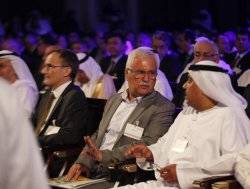The Syrian opposition has said it will need $60b in aid to prevent the country's economy from collapsing if it takes power from President Bashar al-Assad's regime.
George Sabra, a prominent opposition leader, told reporters on Wednesday in Dubai, the commercial capital of the United Arab Emirates, that the economy could collapse within six months without the money.
Sabra also urged delegates at a "Partnership to Invest in Future Syria" meeting in Dubai to immediately launch a Marshall Plan for the Arab country, along the lines of the huge post-World War II recovery programme for Europe.
Syria has been battling armed groups in a conflict that started as an uprising against Assad in March 2011 but has degenerated into a civil war that has left more than 38,000 people killed, according to activists.
Over the "first six months we need $60b" as immediate funding for reconstruction of the country, Sabra told reporters on the sidelines of the meeting.
The country has been devastated mainly by the government's use of aerial bombardments and artillery fire in its bid to crush the uprising.
Sabra said the money must come in the form of aid from "our Arab brothers and the international community on whom we count to fulfill their responsibilities towards the humanitarian crisis our country is facing".
Funding is needed to "resolve the most sensitive and outstanding issues," starting with "securing housing for people after 2.5 million homes have been destroyed" in the conflict, said Sabra, the president of the Syrian National Council.
"What can be described as an economic 'Marshall Plan for Syria' cannot be delayed until the current regime fully collapses. It must be initiated immediately," Sabra told the meeting.
He called for the "Arab and international business community's support" of "fully or almost completely" liberated zones in Syria's northern cities of Aleppo, Idlib and Tal Abyad.
"The regime is in the stage of decline and will not last long," he told the AFP news agency.
Cash for banks
Farah Atassi, a prominent opposition activist, said cash was needed in Syrian banks and the central bank to ensure that vital services such as water, electricity and health continue to be provided.
Sabra also called for the setting up of an "immediate coordination bureau either inside Syria or in any city near the Turkish-Syrian border" to secure the flow of aid and offer rebels "administrative and technical expertise".
The meeting was the second of its kind this year, co-chaired by the United Arab Emirates and Germany.
Over 500 regional and international delegates were meeting in a series of sessions to study strategies for private-sector engagement in helping to rebuild the war-torn country.
German representative Volkmar Wenzel said "we must start with relief and go through many phases before reaching to foreign investment".
Sabra's SNC is a main component of the Syrian National Coalition formed in Doha, Qatar, on November 11. The group has so far gained recognition from Britain, France, Italy, Turkey, the EU and six-nation Gulf Co-operation Council.
"We hope the American stance moves forward towards supporting the Syrian revolt and recognizing the National Coalition as France and Britain did," said Sabra.
In a separate development, four Syrian women, wearing long white dresses, have been arrested for staging a demonstration in a Damascus market calling for an end to the conflict.
"Syria is for all of us," one banner carried by the women said. "For the sake of the Syrian human, the civil society calls for stopping all military operations in Syria," another one read. "You're tired and we are tired. We want to live."
PHOTO CAPTION
President of the Syrian National Council George Sabra speaks with a guest during a conference for the reconstruction of Syria, at Madinat Jumeirah in Dubai November 21, 2012.
Aljazeera


 Home
Home Discover Islam
Discover Islam Quran Recitations
Quran Recitations Lectures
Lectures
 Fatwa
Fatwa Articles
Articles Fiqh
Fiqh E-Books
E-Books Boys & Girls
Boys & Girls  Hajj Rulings
Hajj Rulings Hajj Fatwas
Hajj Fatwas














